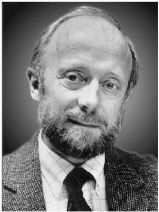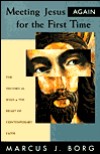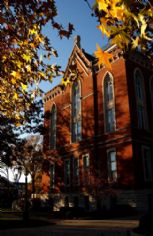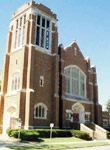Biblical Scholar Marcus Borg to Deliver Mendenhall Lecture November 2
September 12, 2005
 September 12, 2005, Greencastle, Ind. - Marcus J. Borg, the internationally-known biblical scholar, will come to the campus of DePauw University to deliver the fall Mendenhall Lecture on Wednesday, November 2. Described by the New York Times as "a leading figure in his generation of Jesus scholars," Borg holds the Hundere Chair in Religion and Culture in the Philosophy Department at Oregon State University. His speech, "The Heart of Christianity: Rediscovering a Life of Faith: How We Can Be Passionate Believers Today," will begin at 7:30 p.m. in Gobin Memorial United Methodist Church, and is free and open to all.
September 12, 2005, Greencastle, Ind. - Marcus J. Borg, the internationally-known biblical scholar, will come to the campus of DePauw University to deliver the fall Mendenhall Lecture on Wednesday, November 2. Described by the New York Times as "a leading figure in his generation of Jesus scholars," Borg holds the Hundere Chair in Religion and Culture in the Philosophy Department at Oregon State University. His speech, "The Heart of Christianity: Rediscovering a Life of Faith: How We Can Be Passionate Believers Today," will begin at 7:30 p.m. in Gobin Memorial United Methodist Church, and is free and open to all.
Dr. Borg was originally scheduled to deliver the Mendenall Lecture at DePauw in November 2004, but had to cancel due to illness.
Professor Borg is the author of twelve books, including Jesus: A New Vision, and the best-seller Meeting Jesus Again for the First Time. Other works include God at 2000, Reading the Bible Again for the First Time, The Heart of Christianity, and The God We Never Knew, which was named one of 1997's ten best books in religion by Publishers Weekly. Borg sees philosophy as primarily concerned with the role of ideas in our lives. "Ideas matter," Borg says,  "much more than we commonly think they do -- especially our world-views and values, namely our ideas about what is real and how we are to live. We receive such ideas from our culture as we grow up, and unless we examine them, we will not be free persons, but will to a large extent live out the agenda of our socialization."
"much more than we commonly think they do -- especially our world-views and values, namely our ideas about what is real and how we are to live. We receive such ideas from our culture as we grow up, and unless we examine them, we will not be free persons, but will to a large extent live out the agenda of our socialization."
Martin Borg has appeared on NBC's Today Show and Dateline, PBS' Newshour, ABC's World News Tonight and Prime Time with Peter Jennings, and NPR's Fresh Air. A Fellow of the Jesus Seminar, he has been national chair of the Historical Jesus Section of the Society of Biblical Literature and co-chair of its International New Testament Program Committee, and is past president of the Anglican Association of Biblical Scholars and a regular columnist for Beliefnet. His work has been translated into eight languages: German, Dutch, Korean,  Japanese, Italian, Spanish, Portugese, and French. His doctor's degree is from Oxford University, and he has lectured widely overseas (England, Scotland, Austria, Germany, Belgium, Hungary, Israel and South Africa) and in North America, including the Chautauqua and Smithsonian Institutions.
Japanese, Italian, Spanish, Portugese, and French. His doctor's degree is from Oxford University, and he has lectured widely overseas (England, Scotland, Austria, Germany, Belgium, Hungary, Israel and South Africa) and in North America, including the Chautauqua and Smithsonian Institutions.
The Rev. Peter J. Gomes of the Harvard University Divinity School, who delivered the Mendenhall Lecture on November 13, 2001 (read more here), has noted: "Borg is one of the very few New Testament scholars of our age whose learning is so lucid that it takes the Bible back from the specialists and makes it available in all its complexity and splendor to the general reader: nothing short of a blessing, even a miracle!" Lynne Hinton, novelist and author of Hope Springs and The Friendship Cake, adds, "What would we do without Marcus Borg? If he did not exist, we would have to invent him for we have no better guide to the recovery of an authentic Christian faith for these difficult times than this articulate and prolific public theologian." In this book, we are reminded that the heart of Christianity speaks directly to the human heart as a lived, living, and loving faith: now more than ever we need this  authentic affirmation."
authentic affirmation."
The Mendenhall Lectures, which were inaugurated in 1913, were endowed by the Reverend Doctor Marmaduke H. Mendenhall. His desire was to enable the University to bring to campus "persons of high and wide repute, of broad and varied scholarship" to address issues related to the academic dialogue concerning Christianity. Although Mendenhall was a pastor in the North Indiana Annual Conference of what was then called the Methodist Episcopal Church, one of the parents of the United Methodist Church, he explicity dictated that lectures be selected without regard to denominational divisions. The endowment has allowed DePauw to bring theological and religious scholars of international repute to campus for nearly a century.
Back